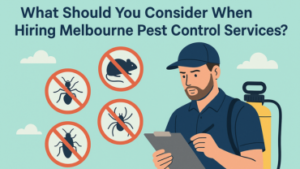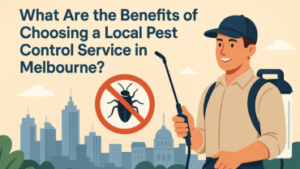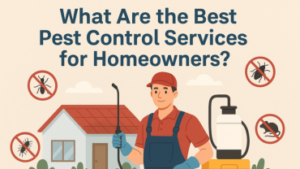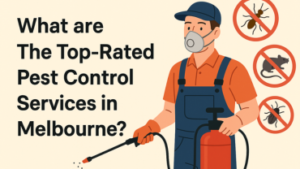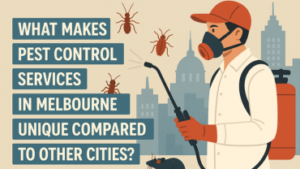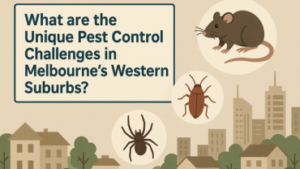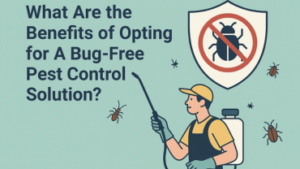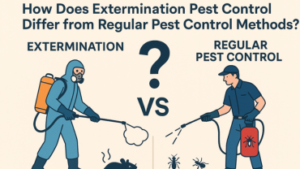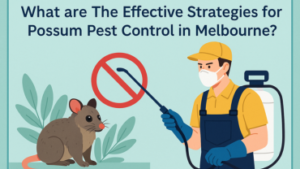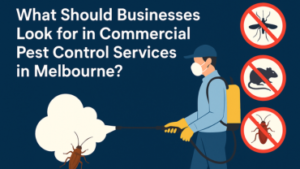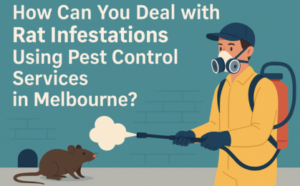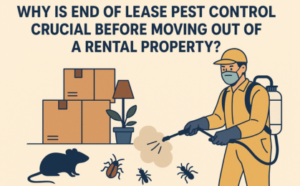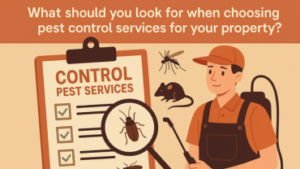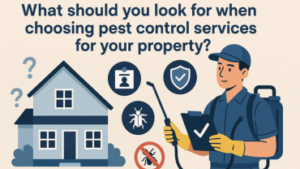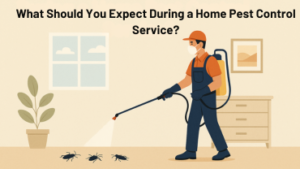Ever woken up to creepy crawlies in your kitchen or mysterious bites on your skin? Before you panic about pests, you’re probably wondering:
“ How Much Do Pest Control Charge?” The truth? Prices vary wildly – from a quick ant spray to emergency termite tenting. At
Chris Pest Control, we’ve seen clients pay anywhere from a modest treatment fee to massive repair bills after choosing the wrong solution.
The real cost depends on what’s invading your home, how long it’s been there, and whether you opt for a quick fix or proper protection. Keep reading to discover why the cheapest quote could end up costing you thousands, and how to get real value for your pest control dollar. We’ll break down exactly what drives the price so you can make an informed decision – because when it comes to pests, what you don’t know
will hurt your wallet.
-
Type of Pest – The Biggest Price Influencer
Common Pests vs. Hard-to-Eliminate Infestations
That trail of ants in your kitchen? Annoying, but relatively affordable to fix. The termites silently eating your home’s frame? That’s when costs skyrocket. At
Chris Pest Control, we categorise pests into two groups: the “nuisance” invaders (like cockroaches or spiders) that need standard treatments, and the “homewreckers” (termites, bed bugs, rodents) that demand specialized—and pricier—solutions. The difference in treatment costs can be dramatic, especially when an infestation has spread undetected.
Seasonal Pests and Their Impact on Pricing
Some pests, like mosquitoes or spiders, are seasonal. High-demand periods may affect
how much do pest control charge due to increased service requests. Booking early or opting for preventive treatments can sometimes save money in the long run.
-
Property Size and Complexity
Residential vs. Commercial Pest Control
A small apartment will cost significantly less to treat than a large warehouse. Commercial properties often require multiple visits and specialised equipment, increasing the overall expense. Residential treatments are generally more affordable but vary based on square footage.
Structural Challenges That Increase Costs
Hard-to-reach areas (like crawl spaces, attics, or multi-story buildings) can make treatments more labour-intensive. If your property has complex architecture, expect a higher price due to the extra time and effort required.
-
Treatment Method – Chemical vs. Eco-Friendly Solutions
Traditional Chemical Treatments
Standard chemical sprays are often the most cost-effective but may not be ideal for homes with kids or pets. The
how much do pest control charge question here depends on the chemicals used and the frequency of application.
Green and Non-Toxic Alternatives
Eco-friendly treatments are growing in popularity but tend to be pricier due to specialised products. If sustainability is a priority, the extra cost may be worth it for safer, long-term pest management.
-
Frequency of Service – One-Time vs. Ongoing Plans
Single Visits for Immediate Problems
A one-off treatment for a sudden ant invasion will be cheaper than a long-term plan. However, recurring pests may need follow-ups, increasing costs over time.
Annual or Quarterly Maintenance Plans
Regular maintenance (like quarterly sprays) can prevent major infestations and may reduce
how much do pest control charge in the long run. Many providers, including
Chris Pest Control, offer discounted packages for ongoing services.
-
Location and Accessibility
Urban vs. Regional Service Rates
Urban pest treatments cost more (blame higher rents and wages), while regional visits add travel fees. Your postcode shouldn’t dictate protection quality, but it does affect the price tag.
Ease of Access to Infested Areas
If pests are hidden behind walls or under floorboards, technicians may need extra time and tools, adding to the bill. The harder it is to reach the problem, the more you’ll pay.
-
Reputation and Expertise of the Pest Control Company
Why Experience Matters
Well-established companies with certified technicians often charge more, but for good reason. Their expertise ensures effective, long-lasting results, reducing the chance of repeat infestations.
Cheap vs. Quality Services – The Hidden Costs
Opting for the cheapest option may lead to ineffective treatments, meaning you’ll spend more over time. Investing in a trusted provider like
Chris Pest Control ensures value for money.
-
Additional Services That Affect Pricing
Inspection and Diagnostic Fees
Some companies charge for initial inspections, while others include them in the treatment cost. Always clarify this beforehand to avoid surprises.
Warranty and Follow-Up Visits
A service guarantee (like free retreatments if pests return) may increase upfront costs but provides peace of mind. Always check the terms before committing.
How to Get the Best Value for Your Pest Control Budget
Compare Quotes but Don’t Compromise on Quality
Getting multiple estimates helps gauge
how much do pest control charge in your area. However, the cheapest option isn’t always the best, look for reliability and customer reviews.
Preventive Measures to Reduce Long-Term Costs
Sealing entry points, maintaining cleanliness, and scheduling regular inspections can minimise infestations, saving you money over time.
How to Negotiate the Best Pest Control Deal
Pest control isn’t just about eliminating bugs, it’s also about getting
the best value for your money. Many homeowners simply accept the first quote they receive, but with the right negotiation tactics, you can secure top-tier service
without overpaying. Here’s how to ensure you’re getting a fair deal.
Questions to Ask Before Signing a Contract
Before committing to a pest control company,
ask these key questions to avoid surprises:
- “What’s included in this quote?”
- Some companies advertise low prices but exclude follow-ups, warranties, or hard-to-reach areas. Ensure you’re comparing apples to apples.
- “Are there any recurring fees?”
- Some providers lock customers into automatic renewals or hidden service charges. Always clarify the billing structure upfront.
- “What happens if the pests return?”
- A true professional will offer a warranty (e.g., free retreatments within a certain period). If they don’t, consider it a red flag.
- “Do you charge extra for emergency call-outs?”
- If you need urgent service (like a wasp nest removal), will there be after-hours fees? Know before you book.
- “Can you provide references or reviews?”
- A reputable company will gladly share testimonials. If they hesitate, walk away.
By asking these questions, you’ll spot hidden costs and ensure you’re working with a trustworthy provider.
Price Matching and Discount Strategies
Did you know most pest control companies will match or beat competitors’ prices? Here’s how to use that to your advantage:
✔
Get Multiple Quotes
- Collect at least three written estimates before deciding. Presenting these to your preferred provider often leads to discounts.
✔
Ask About Seasonal Promotions
- Many companies offer off-peak discounts (e.g., winter deals for rodent control). Timing your service right can save you 20% or more.
✔
Bundle Services for Better Rates
- Need termite protection and general pest control? Companies often discount bundled services instead of charging separately.
✔
Loyalty & Referral Perks
- Some providers offer discounts for repeat customers or if you refer friends. Never be shy to ask!
✔
Flexible Payment Plans
- If facing a large bill (like termite tenting), inquire about interest-free payment options to spread out costs.
Pro Tip: A company confident in its service (like
Chris Pest Control) will work with your budget, not pressure you into overpaying.
The True Cost of Different Pest Control Methods
When dealing with pests, your choice of treatment affects more than just today’s bill, it shapes your long-term costs and peace of mind. Let’s break down what really matters when comparing methods and service frequencies.
Chemical vs. Natural: What Lasts Longer?
Chemical treatments typically cost more upfront but provide stronger, longer-lasting protection. They’re ideal for serious infestations where quick results matter. While the initial price is higher, you’ll likely need fewer repeat visits.
Natural methods are gentler and safer for families with kids or pets, but they often require more frequent applications. What you save initially might be spent on additional treatments down the track.
The smart approach? At
Chris Pest Control, we often blend both strategies, using targeted chemicals where needed and natural solutions where possible, to balance effectiveness with safety.
How Often Should You Treat Your Home?
Monthly pest control makes sense for high-risk properties or homes with persistent pest histories. While it’s the most thorough option, it’s often more than what the average household needs.
Quarterly treatments hit the sweet spot for most homes. They keep pests under control without breaking the bank, catching seasonal invaders before they become problems.
Annual services may seem economical, but they leave big gaps where pests can gain a foothold. What you save on prevention could cost you dearly if an infestation takes hold.
The Right Choice Saves You Twice
Good pest control isn’t about finding the cheapest option; it’s about choosing what actually works for your situation. The right approach:
✔
Solves your current pest issues
✔
Prevents expensive future problems
✔
Fits your budget without cutting corners
Conclusion – Smart Pest Control Starts with the Right Choice
Now that you know what influences
how much do pest control charge, it’s time to take action. Whether you’re dealing with a minor nuisance or a full-blown infestation,
Chris Pest Control offers tailored solutions that fit your budget and needs.
Don’t let pests take over your home or business!
Contact Chris Pest Control today for a free, no-obligation quote. Our expert team delivers effective, affordable treatments with lasting results. Protect your space-call us now or book online!

